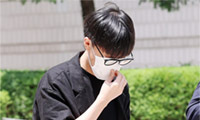Over-the-Top Is Overrated As Partygoers Go Anti-Club
NEW YORK - Superdive is pretty much nothing. And nothing is as hot as anything these days.
Superdive, which opened in late June, is a much blogged-about bar in the East Village that has deconstructed nearly every imaginable pillar of the over-the-top New York night life scene. The bathrooms have plywood stalls, a doorman checks IDs but little else, and instead of bottle service, Superdive offers keg service - tableside.
“Since everything else is so chichi,” the manager, Keith Okada, said, “we thought, ‘Why not offer keg service?’”
At a table, a group of men in their 20s and 30s shared a 5-liter keg of EKU Pils beer to celebrate what they call “Manday,” a semiregular male-bonding night out.
Superdive suited them more than a noisy club with menacing velvet ropes and $400 bottles of vodka, said David Sitt, 32, a Manday regular. “We’re in a period where a snotty attitude is not helping people feel better about themselves,” he said.
Super fancy is out. Revenues are down 20 to 40 percent in the last year at those throbbing nightclubs that flourished by catering to Wall Street guys who casually swiped their credit cards for four figures, club owners said. Many once-popular clubs, like Lotus, Mansion and Room Service, have closed or are being remodeled.
“Three or four years ago it seemed like every bar in New York had a rope and some imposing-looking guy,” said David Rabin, an owner of Lotus.
Now, he said, haughtiness is as stylish as a overly expensive mortgage payment. Club owners are searching for a new night life formula that jibes with the culture’s low-key mood, yet attracts whatever is left of the city’s disposable income. “People are still looking for what is the right approach here going forward,” Mr. Rabin said. “There is a lot of uncertainty.”
Ideas differ, but the owners agree on one thing: the word “club” has about as much cultural relevance as the Maca rena. Noah Tepperberg, one of the owners of Marquee, for instance, is calling Avenue, his newest endeavor that opened in June, a “gastro- lounge.”
For most of the last decade, club owners loved to describe their clubs as exclusive. Now, some want to be friendly and inclusive.
In Chinatown, Santos Party House, a dance club that opened last year, has few tables, $10 cocktails and a nonexclusionary door policy. The point of the dance club seems to be dancing.
At Avenue, it’s not only the word club that’s forbidden. Don’t use the term “bottle service,” either - even though bottles, starting around $350, are served in silver buckets, a practice that has been known for years as bottle service. Mr. Tepperberg said: “We call it ‘table service.’”
스마터리빙
more [ 건강]
[ 건강]이제 혈관 건강도 챙기자!
[현대해운]우리 눈에 보이지 않기 때문에 혈관 건강을 챙기는 것은 결코 쉽지 않은데요. 여러분은 혈관 건강을 유지하기 위해 어떤 노력을 하시나요?
 [ 건강]
[ 건강]내 몸이 건강해지는 과일궁합
 [ 라이프]
[ 라이프]벌레야 물럿거라! 천연 해충제 만들기
 [ 건강]
[ 건강]혈압 낮추는데 좋은 식품
[현대해운]혈관 건강은 주로 노화가 진행되면서 지켜야 할 문제라고 인식되어 왔습니다. 최근 생활 패턴과 식생활의 변화로 혈관의 노화 진행이 빨라지고
사람·사람들
more많이 본 기사
- 황하나, 마약 도피 중 캄보디아서 출… 1
- 트럼프 “소말릴란드 아는 사람 있나?”…이스라엘 승인에 ‘NO’
- 韓정부, 노란봉투법 해석 지침 공개… 하청 임금·근로조건 좌우하면 ‘진짜 사장’
- 러, 젤렌스키 미국행 앞 대규모 공습…우크라도 러에 드론 공격
- “아동 수출국 오명 벗는다” 70년 만에 해외입양 중단
- 한파에 고드름이 주렁주렁… 서울 이번 겨울 첫 한파주의보
- IS 확실했나…트럼프 ‘성탄절 나이지리아 폭격’ 갸우뚱
- ‘서해 공무원 피격 은폐’ 혐의 서훈… 2
- “올해 최고 주목받은 테크 거물은 머스크 아닌 래리 엘리슨”
- 특검, 尹에 징역 10년 구형… “법치주의·사법질서 파괴”
- 뉴욕시 폭설에 항공기 수천편 취소·지연 사태
- 쿠팡 ‘정부 반박’ 영문성명 미묘한 표현차… ‘잘못된 비난’ 부각
- ‘정보 유출자 셀프 조사’ 경찰에 늦게 알린 쿠팡… 증거인멸 의혹
- ‘김건희에 로저비비에 선물’ 김기현 부인 특검 재출석…곧 기소
- 찰스 3세, 내년 방미 추진…트럼프에 英왕실 ‘매력 공세’될까
- 올해 美 기업 파산신청 증가… “관세·고물가·고금리 원인”
- 마지막 토요일도 도심 집회… “내란 단죄” vs “윤 어게인”
- 쏟아지는 갑질·특혜 의혹… 버티는 김병기, 속 끓는 정청래
- ‘NCT 탈퇴’ 태일, 성폭행 혐의로 결국 감옥行..징역 3년 6개월 확정
- 국힘 “신천지로 통일교 특검 물타기 안돼”…與 “성역없이 규명”
- 이혁재가 또.. “빌려간 3억원 안 갚아” 사기 혐의로 피소
- 특검, ‘로저비비에’ 김기현 부부 기소…尹 뇌물 수사는 경찰로
- 오바마케어 가입자수 감소
- 보수 야당 “의원직 사퇴하고 법심판 받아야”…김병기에 총공세
- ‘역대 최연소’ 백악관 대변인 레빗,… 1
- 러, 트럼프-젤렌스키 종전회담 직전 … 1
- “올해 최고 주목받은 테크 거물은 머스크 아닌 래리 엘리슨”
- 소싯적 ‘치기어린’ 주소 “굿바이”…지메일 주소변경기능 도입
- 효연, 소녀시대 수입 서열 공개 “1위 나 아냐..윤아·태연이 더 벌어”
- [이지 사이언스] “온난화 막으려면 세계인구 44% 식단 바꿔야…문제는 소고기”
- LA 등 서부에 사흘째 폭우…동부엔 폭설 예보
- ICE 버지니아 구금시설 ‘포화’…수감자 역대최고
- 특검, 김건희 ‘금품 수수’ 무더기 기소… 뇌물 여부는 경찰 몫으로
- “도시 빈민에 전한 성탄의 온기”
- ‘손흥민 감격의 첫 우승’ 올해 축구계 기적 톱8 선정 ‘선수로는 유일’
- 린다 한 “내년 1월17일 별도 한인회연합회 만들겠다”
- 가지마오 세월님
- 한미장학재단에 3만달러 영구장학금 기탁
- 복음으로 세상 섬길 인재 배출
- 탑여행사 추천 여행지-도시 자체가 박물관인‘피렌체’
- “출생시민권은 사기”⋯ 이민 2세대 공격 초점 맞춘 트럼프
- 뉴욕·뉴저지 연말 대대적 음주운전 단속
- 곽도원, 음주운전 3년 만 복귀각..스토리제이컴퍼니 측 “미팅 했지만 계약 단계 아냐”
- 與 ‘통일교·신천지 특검법’ 발의… 野 “뜬금없다”
- 8시즌 뛰고 ML 역대 17위 “오타니 GOAT 될 것”, ML 역대 50인 선정
- 국제은값 폭등에 개인투자자들 銀투자 대거 유입
- ‘학자금 상환’ 안하면 임금압류
- 젤렌스키 “28일 트럼프와 종전안 논의…영토·원전 외 90% 완성”
- 조지아 역주행 사고, 한인남편 이어 임신 아내도 사망
- VA·MD 7명 생굴 먹고 식중독…22개주 60여명 감염
1/5지식톡

-
 미 육군 사관학교 West Poin…
0
미 육군 사관학교 West Poin…
0https://youtu.be/SxD8cEhNV6Q연락처:wpkapca@gmail.comJohn Choi: 714-716-6414West Point 합격증을 받으셨나요?미 육군사관학교 West Point 학부모 모…
-
 ☝️해외에서도 가능한 한국어 선생님…
0
☝️해외에서도 가능한 한국어 선생님…
0이 영상 하나면 충분합니다!♥️상담신청문의♥️☝️ 문의 폭주로 '선착순 상담'만 진행합니다.☎️ : 02-6213-9094✨카카오톡ID : @GOODEDU77 (@골뱅이 꼭 붙여주셔야합니다…
-
 테슬라 자동차 시트커버 장착
0
테슬라 자동차 시트커버 장착
0테슬라 시트커버, 사놓고 아직 못 씌우셨죠?장착이 생각보다 쉽지 않습니다.20년 경력 전문가에게 맡기세요 — 깔끔하고 딱 맞게 장착해드립니다!장착비용:앞좌석: $40뒷좌석: $60앞·뒷좌석 …
-
 식당용 부탄가스
0
식당용 부탄가스
0식당용 부탄가스 홀세일 합니다 로스앤젤레스 다운타운 픽업 가능 안녕 하세요?강아지 & 고양이 모든 애완동물 / 반려동물 식품 & 모든 애완동물/반려동물 관련 제품들 전문적으로 홀세일/취급하는 회사 입니다 100% …
-
 ACSL 국제 컴퓨터 과학 대회, …
0
ACSL 국제 컴퓨터 과학 대회, …
0웹사이트 : www.eduspot.co.kr 카카오톡 상담하기 : https://pf.kakao.com/_BEQWxb블로그 : https://blog.naver.com/eduspotmain안녕하세요, 에듀스팟입니다…
케이타운 1번가
오피니언

새해 더 중요해지는 노동법 준수

연말연시, 안전하고 차분하게
 캐슬린 파커 워싱턴포스트 칼럼니스트
캐슬린 파커 워싱턴포스트 칼럼니스트 [캐슬린 파커 칼럼] 지미 라이의 마지막 희망
 유경재 나성북부교회 담임목사
유경재 나성북부교회 담임목사 [한국춘추] 미국의 힘
 전병두 서북미수필가협회 회원
전병두 서북미수필가협회 회원 [금요단상] 비자 발급
 박일근 / 한국일보 수석논설위원
박일근 / 한국일보 수석논설위원 [지평선] 스님의 주례사
 신상철 / 고려대 고고미술사학과 교수
신상철 / 고려대 고고미술사학과 교수 [미술 다시보기] 신의 모습을 닮고자 한 예술가
 스티브 강 전 한인민주당협회 회장
스티브 강 전 한인민주당협회 회장 [스티브 강 ‘인사이드 미국’] 2026 중간선거: 트럼프 지지율 하락이 말해주는 것
 김홍일 케이유니콘인베스트먼트 대표
김홍일 케이유니콘인베스트먼트 대표 [기고] 안정의 기준은 어떻게 제도가 되었나
1/3지사별 뉴스

물류거점창고에 불체자 8만명 수용 추진
도널드 트럼프 행정부가 이민자 구금·추방을 효율화하기 위해 전국 물류거점 창고에 8만명 규모의 수용시설 확보를 추진한다고 24일 워싱턴 포스트…
‘학자금 상환’ 안하면 임금압류

“온 세상에 희망·평화의 빛 스며들길”
가자지구와 우크라이나에서의 전쟁, 고립과 불평등으로 세상이 어지러운 가운데 워싱턴 지역 각급 한인교회와 성당들이 성탄절을 맞아 일제히 예배와 …
“연말은 스트레스·새해 결심은 없다”

“올해 최고 주목받은 테크 거물은 머스크 아닌 래리 엘리슨”
올해 미국에서 가장 주목받은 기술업계 거물은 일론 머스크 테슬라 최고경영자(CEO)가 아닌 래리 엘리슨 오라클 창업자·회장이라고 블룸버그 통신…
[새해부터 이렇게 달라진다] 최저임금 또 오르고… 유급 병가는 더 확대

오늘 하루 이 창 열지 않음 닫기 























































.png)


댓글 안에 당신의 성숙함도 담아 주세요.
'오늘의 한마디'는 기사에 대하여 자신의 생각을 말하고 남의 생각을 들으며 서로 다양한 의견을 나누는 공간입니다. 그러나 간혹 불건전한 내용을 올리시는 분들이 계셔서 건전한 인터넷문화 정착을 위해 아래와 같은 운영원칙을 적용합니다.
자체 모니터링을 통해 아래에 해당하는 내용이 포함된 댓글이 발견되면 예고없이 삭제 조치를 하겠습니다.
불건전한 댓글을 올리거나, 이름에 비속어 및 상대방의 불쾌감을 주는 단어를 사용, 유명인 또는 특정 일반인을 사칭하는 경우 이용에 대한 차단 제재를 받을 수 있습니다. 차단될 경우, 일주일간 댓글을 달수 없게 됩니다.
명예훼손, 개인정보 유출, 욕설 등 법률에 위반되는 댓글은 관계 법령에 의거 민형사상 처벌을 받을 수 있으니 이용에 주의를 부탁드립니다.
Close
x